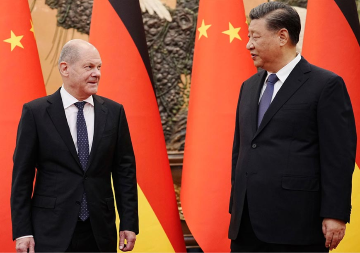
No political or security analyst could have anticipated just a year ago when the first ministerial meeting of the Quadrilateral (Quad) Security Dialogue took place on the side-lines of the UN General Assembly in New York that the foreign ministers of the four participating countries — Australia, India, Japan and USA — would travel specially during the current highly contagious pandemic to Tokyo to attend a stand-alone meeting of the grouping. This is testimony to the long-distance that the four countries have traversed over the last one year as far as collaboration under the Quad is concerned.
US President Donald Trump was the master of ceremonies at the resurrection of the Quad in Manila in November 2017 after a gap of ten years. The previous hesitant attempt by the four countries had occurred at the time of the Tsunami in South and Southeast Asia in 2004 when they collaborated to provide succour to the affected countries in the region. The then Japanese prime minister Shinzo Abe floated the idea of the Indo-Pacific during his address to the Indian Parliament in 2007. The initiative however sputtered to a standstill quickly on vigorous opposition from China which castigated the move as being directed against it.
The global economic crisis proved to be a shot in the arm for China as it was able to register a comparatively robust growth by injecting a significant stimulus while the western economies including USA, Europe as well as Japan experienced a precipitous downturn.
The decade beginning 2008 witnessed visible evidence of China’s increasing political, military and economic strength as well as its growing assertiveness in its bilateral dealings with its neighbours and in international fora. The two defining events of this period for China were the international financial and economic crisis and the Beijing Olympics in 2008. The global economic crisis proved to be a shot in the arm for China as it was able to register a comparatively robust growth by injecting a significant stimulus while the western economies including USA, Europe as well as Japan experienced a precipitous downturn. Moreover, the impressive hosting of the Olympics by Beijing in 2008 imbued it with confidence that it was ready to take on the world.
A few other significant developments took place over the last decade. Although Chinese expansionism had started becoming evident from the reign of Hu Jintao, it assumed an entirely different dimension with the advent of Xi Jinping as the General Secretary of the Chinese Communist Party in 2012. Soon after taking over, he floated the aspirational idea of the ‘Chinese Dream’ of making China a moderately prosperous country by 2021 and taking back all territories that it considered to be its own by that date.
Another significant course of events ensued when China started occupying and militarising islands as also creating artificial ones in the South China Sea (SCS) from 2009 onwards. The unfavourable verdict on China’s claims in the SCS by the Hague based Permanent Court of Arbitration in July 2016 in the case filed against it by Philippines also did not deter it from advancing relentlessly in establishing de facto control over most of the SCS.
Notwithstanding the aggressive denials by China, it is clear that it was deceitful in dealing with the South China Sea issue when the epidemic first surfaced at the end of last year.
The final step was taken by China after it unleashed the coronavirus on the world early this year. Notwithstanding the aggressive denials by China, it is clear that it was deceitful in dealing with the issue when the epidemic first surfaced at the end of last year.
The scenario with rest of the world frantically grappling with the twin challenges of the pandemic as well as the unprecedented economic downturn and the resultant social and political upheaval in several countries was apparently viewed as a strategic opportunity by China to realise its expansionist ambitions. In the absence of coronavirus, possibly Beijing might have taken a few more years to consolidate itself internally and externally.
China needs to be thanked for the rapid intensification in engagement amongst the Quad nations. For more than two years after the creation of the Quad in November 2017, meetings among the four countries took place at level of Joint Secretary/Director General in the foreign ministries of the four countries on the sidelines of major summits. China had condescendingly dismissed it as ‘’froth on the ocean surface’’ and predicted that it would soon disintegrate under the weight of its own contradictions. That did not happen.
Only Philippines took the bold step of dragging China to the PCA but after obtaining a resounding victory, it decided against pressing home its advantage.
The four members of the Quad and several other countries had already started feeling deeply concerned over the last many years at the increasing Chinese assertiveness in the SCS. China had over the past many years significantly expanded its military control over SCS and none of the ASEAN member states or others lifted a little finger against it possibly because of their huge dependence on China for trade or investments including under the Belt and Road Initiative. Only Philippines took the bold step of dragging China to the PCA but after obtaining a resounding victory, it decided against pressing home its advantage.
For the last several decades these countries have benefitted from the security presence of USA in the region and dynamic economic engagement with China. They do not wish to choose sides between the incumbent super power and the aspiring challenger.
Matters came to a head with the unprecedented spread of coronavirus around the world at the beginning of this year. China’s initial attempts to conceal its culpability, its muscle flexing against India, Japan, Taiwan, Hong Kong, Vietnam, Malaysia and its expansionist designs on its small neighbours like Bhutan, Tajikistan and others have mobilised the world against it. Its acts of commission and omission have been compounded by its ‘Wolf Warrior’ diplomats, economic coercion, weaponisation of critical items like drugs and pharmaceuticals, ventilators, etc.
This is of course not to suggest that China has been isolated in the world. It is too large a country in area, population, economy and political and military strength to be isolated. It has friends and supporters around the world who view China as an attractive economic opportunity. But, the antagonism of Quad countries and several developed countries in Europe — like UK, France and possibly Germany — could have a significant adverse impact on China’s economic wellbeing and social and political stability.
The recent aggression by China against India in Eastern Ladakh has laid bare the hypocritical and destructive designs of China. As a result, India is now in the forefront of upgrading and broadening the scope of the Quad.
This is one of the preeminent factors responsible for catapulting the Quad to its position today. In 2017, India was seen as the most reluctant member of the grouping as it realised that it is the only one to have a 3,488 kms long disputed land boundary with China. Also, its relations with Beijing are particularly complex because it looks upon India as a strategic competitor to its numero uno position in Asia. However, the recent aggression by China against India in Eastern Ladakh has laid bare the hypocritical and destructive designs of China. As a result, India is now in the forefront of upgrading and broadening the scope of the Quad.
India’s relations with the other three members of the group have also witnessed a remarkable upswing over the last few years. Relations between India and Japan have strengthened beyond recognition since Prime Minister Narendra Modi met his counterpart Shinzo Abe in August 2014.
With Australia, the transformation in bilateral partnership has been no less remarkable. It is likely that because of the growing convergence of views at the strategic level between the two countries, Australia is invited back to the Malabar Exercises expected to take place in November 2020.
India’s ties with USA have emerged as the most consequential and according to Modi “an indispensable partnership” in current times. India and USA share broadly similar world views, particularly as far as confronting the untrammelled rise of China is concerned. During the coronavirus outbreak, senior officials of the Quad Plus New Zealand, Republic of Korea and Vietnam have met virtually at Foreign Secretary/Vice Minister level every week to share experiences on fighting the pandemic.
While most of the countries did not explicitly mention China — USA being the exception — there were various implicit references to it.
The Quad ministers after their meeting in Tokyo did not release a joint statement. They however issued separate readouts. These provide a sense of the huge overlap between their positions.
While most of the countries did not explicitly mention China — USA being the exception — there were various implicit references to it. The lack of consensus on whether or not — and how — to mention China might have been a possible reason for the countries to not release a joint statement. US said that Beijing’s behaviour vis-à-vis Australia, India, and Japan over the last few months — rather than the Trump administration’s encouragement — increased their enthusiasm for the Quad. Non-issuance of a joint statement gives the impression that there were unbridgeable differences between the members on some issues. It is however obvious that there is a huge convergence of positions on China. It would be advisable for them to work on issuing a joint statement after the next ministerial meeting.
The readouts of the four countries noted the importance of regularising the ministerial, as well as continuing working-level and subject experts’ meetings. All four also emphasised the importance of working with other like-minded partners, even beyond the ASEAN, particularly in Europe. The visit to Tokyo also provided an opportunity to the four foreign ministers to meet with the new Japanese Prime Minister Yoshihide Suga, as well as have bilaterals among themselves.
All four also emphasised the importance of working with other like-minded partners, even beyond the ASEAN, particularly in Europe.
Going forward, the Quad should actively contemplate expanding the coverage of issues that it would deal with. These could include but not be limited to 5G technology, quality infrastructure, resilient supply chains, connectivity, HADR (Humanitarian Assistance and Disaster Relief), cyber-security, rare-earths, counter-terrorism, countering disinformation, combatting piracy and others. It would also need to reach out to other like-minded countries like Vietnam, Indonesia, UK, France, Germany, etc. to provide greater inclusivity and credibility to the evolving institution.
An Indo-Pacific security architecture would have to be evolved. This should ensure a free, open and rule-based Indo-Pacific confirming freedom of navigation, respect for territorial integrity and sovereignty, and resolution of all disputes through dialogue and in conformity with international law.
The increasing aggressiveness of China is a challenge that the Quad and all like-minded countries need to confront together. The recent Quad meeting in Tokyo demonstrated the resolve of these countries to work jointly so that China’s threat to peace in the region and the existing rule-based world order is contained.
The views expressed above belong to the author(s). ORF research and analyses now available on Telegram! Click here to access our curated content — blogs, longforms and interviews.




 PREV
PREV


